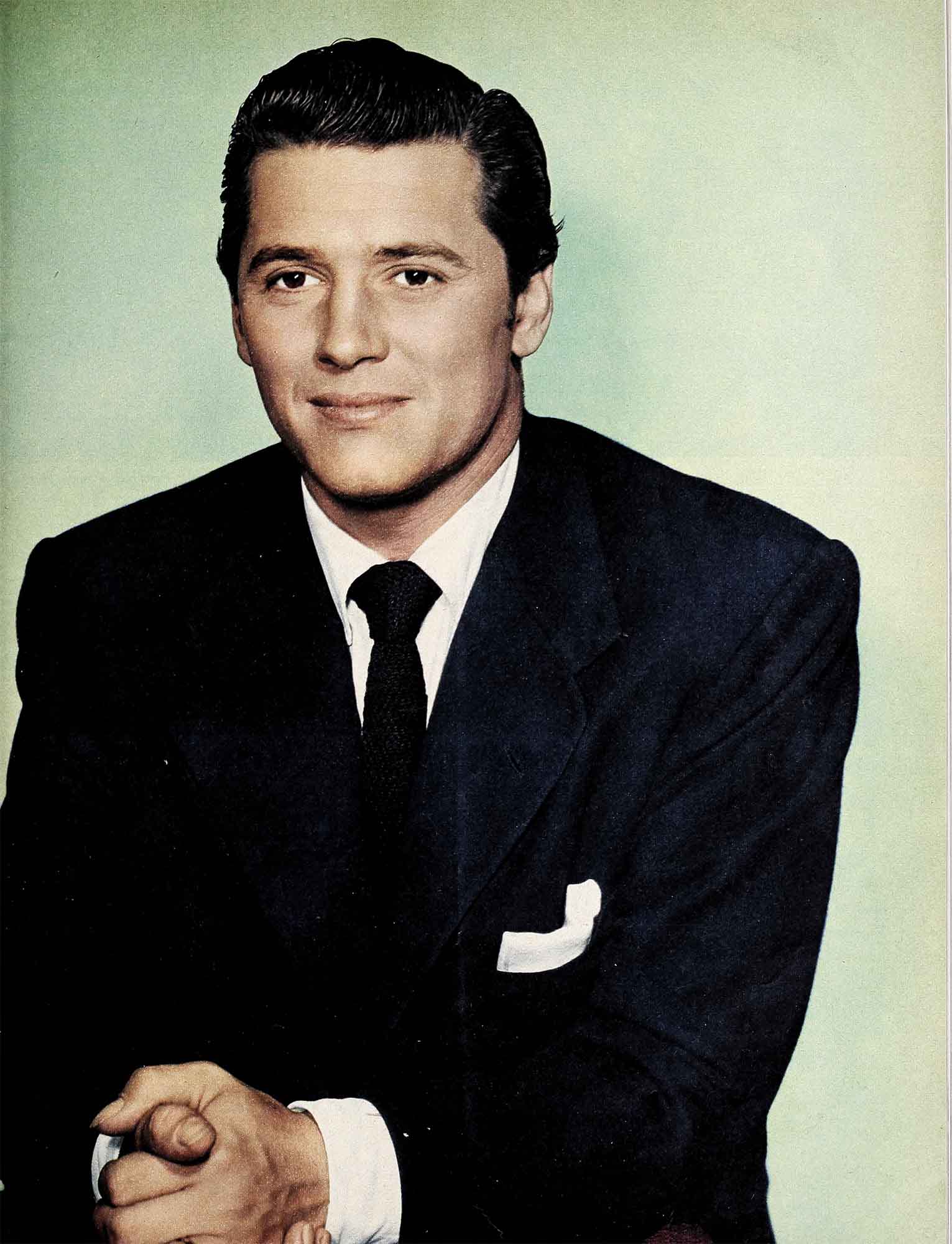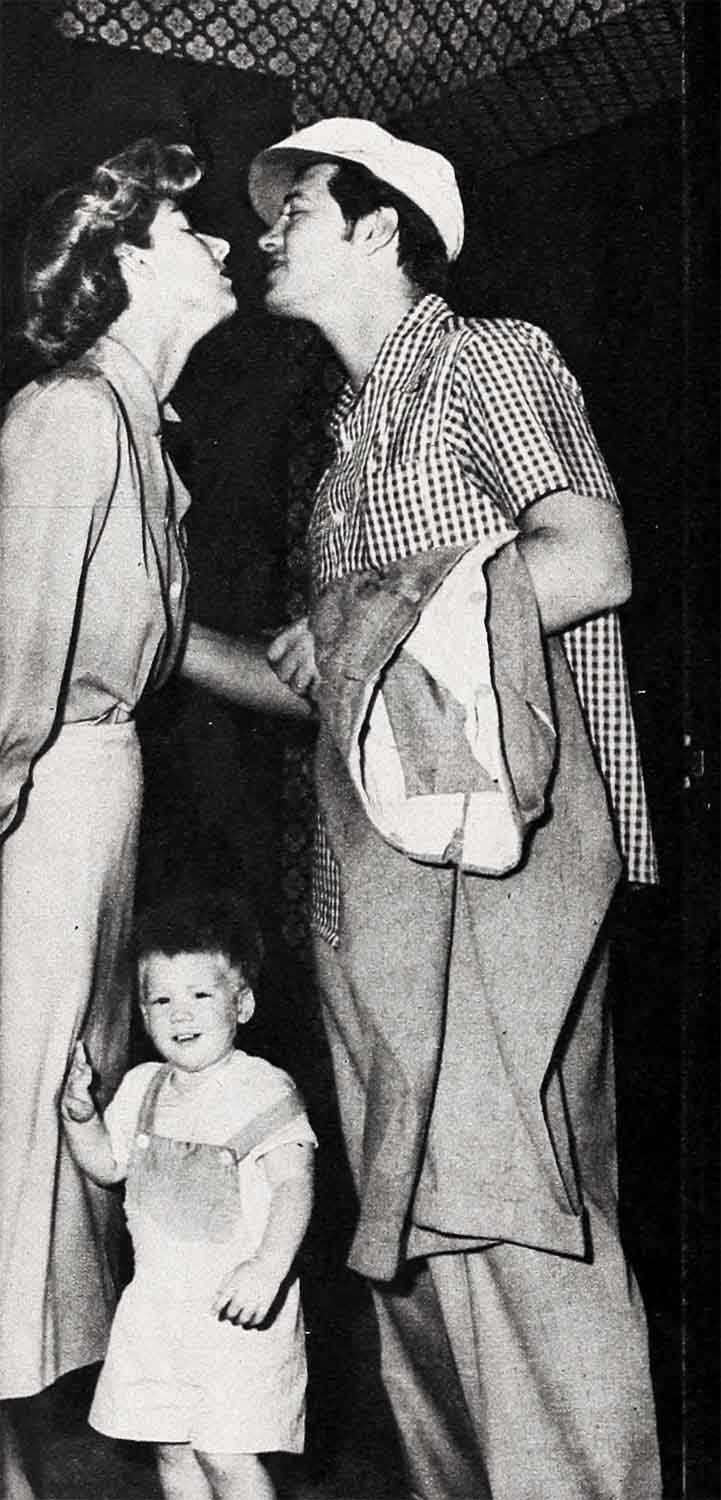He Says It With Music—Gordon MacRae
Gordon MacRae, at sixteen, knew he wanted, above all, to sing. “And that was about the only thing I did know then, for sure” he grins.
His father, William MacRae, was a brilliant inventor and a prosperous manufacturer of machinery used in the milling industry. He had hoped that his son would join him and succeed him in his favorite enterprises. And Gordon, who loved his father, tried. He worked summer vacations in the machine shop, learned the uses of all the bewildering array of mechanical marvels the place contained. However, at quitting time, one September afternoon, he stood gazing through a window, drumming on the pane with his fingers and humming to himself, dejectedly.
His father put a hand on his shoulder. “You don’t like this, do you, son?” he asked, gesturing at the shop. Before the boy could answer, he hurried on. “If there’s anything of any importance and value that I can tell you, my boy, it’s this. Never, never try to force yourself into any work which you don’t enjoy. You’ll never succeed at it. I don’t know what you want to do, and perhaps, you don’t either, yet. But when you find out what it is, do it, and give it everything you have.”
But Gordon knew. He wanted to sing. He didn’t know then, just where or how he wanted to sing, but that didn’t matter, if he could only do it so that people would like to hear him.

He’s been singing ever since, whenever the spirit moved him, sometimes with surprising results. There was the time, several years later, when he was a page boy at the NBC studios in New York and was taking a breather from his duties in the lounge. Suddenly, from nowhere, there appeared a gentleman who introduced himself as George Jackson. “Do you read music?” he asked. He was, he revealed, with the Horace Heidt organization. A singer was leaving them unexpectedly. Would Gordon like to audition for the spot? Gordon would, did, and soon was singing like everything with one of the big name bands.
MacRae was the first actor since Bing Crosby to come into pictures with a ready-made audience, who loved his voice but had never seen his face. He felt much as Bing felt in his early motion picture days when he used to moan, “When they get a load of my pan, will they start breaking up my records?”
Gordon thought of this a few months ago, when he was in Kansas City while “Look for the Silver Lining” was being shown. He dropped into a juke joint where a beery character was playing one of his recordings over and over.
“This guy, MacRae, sends me,” said the beery one, with dreamy delight. “D’you like ’im?”
“He sings some numbers in a picture showing just down the street,” Gordon volunteered.
The beery one considered. “Unh! Uh!” he decided, suddenly. “Don’t wanna see his face. He might not send me any more!”
There were four MacRaes when they arrived in Hollywood, two years ago. Gordon and Sheila and two little girls, Meredith Lynn and Heather Allison. There are five now, since the advent of small William Gordon MacRae who recently had his first birthday cake.

When you meet the MacRaes, you find it almost impossible to believe that they have actually been married nine years and that they are the parents of this husky trio of youngsters, they look so very young, themselves. Sheila was in her teens when Gordon first met her at the Millpond Playhouse at Roslyn, Long Island, where they were both trying to acquire acting experience. A summer stock company furnishes beautiful opportunities for whirlwind courtship, but this young couple had the conventional obstacles of the money question, as well as parental objections, because of Sheila’s extreme youth. It took what seemed to them an interminable time, seven months, to surmount these and to marry.
Now they think they are at last “putting down roots” on an acre of ground in the San Fernando Valley, in a modest, comfortable house which will have to be enlarged practically at once to accommodate a growing family, three dogs, two cats and a brace of love-birds.
Sheila, who has exquisite taste, has had a wonderful time accumulating the maple furniture and soft-toned fabrics which make their home seem such a peaceful dwelling.
“This is such a wonderful place for lazy people,” Gordon says, “that you work as hard as you possibly can, while you are working, in order to earn time to be incredibly dormant when you are free.”
You may wonder when he ever has time to be even a little bit lazy, with a weekly radio show, numerous recordings to make and many pictures coming at him in swift succession. And consider that he had to learn to ride horseback for “Return of the Frontiersman,” and that he spent gruelling hours every day for weeks learning to dance, for the first time in his life, for “The Daughter of Rosie O’Grady.”
They haven’t had the time or inclination to give parties, except for a few intimate ones. Afterwards, they play games or have music (Gordon is likely to play the clarinet if not firmly discouraged), or just talk.
Gordon was born in East Orange, New Jersey, but his family moved to Syracuse, New York (where his father established those factories), while he was very young. He went to grammar and high school there and then to Deerfield Academy in Massachusetts, always entering enthusiastically into any amateur theatricals, especially if there was a singing role to be had. “I was a ham at the age of four,” he relates, “when they let me ‘lead the band’ in kindergarten! I can even remember that triumph.” He earned his first professional fees at the age of twelve when he was allowed to be “the heavy” in a series of radio programs for children.
After Deerfield, he tried New York and did what he could until the page boy job led to the spot with Horace Heidt. There were tours of night clubs and theaters, until his appearance as singing lead of “Three to Make Ready.” He was auditioning for a role in the stage production of “Look, Ma, I’m Dancing!” when Bill Orr, then a talent scout for Warner Brothers, happened to drop in. Gordon didn’t get the part in “Look” but Orr liked his audition so much, the next thing the MacRae family knew, it was being rushed to Hollywood.
Sheila is tall, graceful and glowingly blonde, and her husband is convinced that if she will only revive her early acting ambitions, she will become an important motion picture star.
Friends, of course, protest. “But, Gordon, you’ve seen what happens to marriage when there are two careers in one family. Aren’t you afraid?”
He is definitely not afraid. “With nine years of successful marriage behind us, and three nice kids, wouldn’t it be a breach of faith to admit any fears?” he demands. “Sheila is talented and it is always wrong to stifle talent for any reason. Talent doesn’t belong, really, even to the person who has it. It’s a sort of trust.”
He has only recently discovered that he actually likes to save money, although Sheila has been pointing out to him for years that it was a pleasant occupation.
“It does more things for you than you could have dreamed,” he marvels. “Even makes you a better actor. I know now that an actor with money in the bank can be better at his job because he is a more relaxed individual.”
If he could, he would climb a mountain and proclaim to all who are young:
“Find out what you want to do and work at it. Have joy in it, and be grateful for what is not actually yours, but is divinely given!”
THE END
It is a quote. PHOTOPLAY MAGAZINE JANUARY 1950




